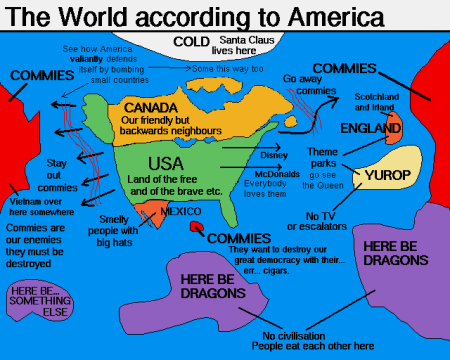
Would YOU hire any of these foreign applicants? Each of the following practically SCREAMS “I want a job but I am completely incompetent in the language–“Don’t hire me, or this is how I would communicate with your clients in English….” None of these applicants seems to realize that IT’S ALL ABOUT THE DETAILS.

These examples (names changed) come from a job board in Morocco, from people looking for jobs with American companies:

1. “I’m a student at Ben Messik University in casablanca. i got my DEUG in English literature and i’m intrested in having a job with you.”
American Employer Reaction: Casablanca is not even captitalized, interested is misspelled, and no American company would have a clue what DEUG means. “i” is not capitalized in two places.
2. “iam 23/m iam looking for any chance to work in usa in any think i have a experionce and i speak english not bad”
American Employer Reaction: This person clearly doesn’t know that a sentence must be started with a capital letter and finish with a period. “iam” is not even a word. The country is not even written correctly. It must be all in capitals with periods following each letter, and preceded by “the,” as in “the U.S.A.” The word “i” must NEVER be written in lower case. Experience is misspelled. English is missing a capital letter. It is a run-on sentence instead of two clear sentences.

3. “Hello; my name is mohamed saddiki, i work for the Marriott Company in Myrtle Beach South carolina as a Laundry Assistant Director. I would like o have a job with one of the American companies or Agencies in Morocco. Thanks.”
American Employer Reaction: This person lives in America, yet hasn’t even learned that his own name needs to have capital letters! Carolina is missing a capital letter and to is misspelled as o. Agencies should not be capitalized. YES, even a laundry director is expected to know these things in an American company.
4. “my name is hicham, american citizen (probably a dual-citizen) looking for job with one of the american companies in rabat, morocco”
American Employer Reaction: Did not start sentence with a capital letter, doesn’t even know to capitalize his own name, or the word American, nor the words Rabat and Morocco. Does not put a period at the end of the sentence.

5. Hi, Im mehdi bouaziz I study english at cady ayyad college and I wish to work in english copanies or hotels
American Employer Reaction: I’m is lacking an apostrophe. This person doesn’t even know that his name should be capitalized. The words Cady, Ayyad, College and English all need to be capitalized. Companies is misspelled. There is no period at the end of the sentence.

6. “Hello, first to start this off, I am american living in the USA, and looking to make my life in Morocco. I am fluent in english, spanish. I can speak, read and write a bit of french as well. I am very motivated, hard worker, flexable, and i will make a full commitment to the company that will hire me. I currently working for a academy out of maryland as an account manager which i have been here over 3 years. At the current moment i am working on my B.S. degree in accounting. my past and current experiences has been, account manager, payroll manager, bookkeeper and regional sales. i have plus over 10 years in accounting field. and looking for a position in morocco prefer casablanca, rabat or setat.in a american company or moroccan company, but i dont speak moroccan yet. in god willing i hope that i can. you can reach me at sweetlove2792@yahoo.com only if you think that you make me an offer. please only serious commitments i am not here to play around. i travel two times in a year to casablanca morocco, so if there is a need to meet that would not be an issue. salaam”
American Manager Reaction: Even if this person is born in America (even worse), they clearly didn’t learn much in school. Lack of nearly all necessary captials. English, Spanish, Maryland, Morocco (2x), Casablanca (2x), Rabat, Setat, American, Moroccan (2x), God, and Salaam are not captialized. First words of sentences are not capitalized. The word “i” is never captialized, as it must always be. USA is not written correctly with periods between the letters. Says “a” instead of “an” academy, and “a american company” instead of an American company. Leaves words out of the middle of sentences. Doesn’t leave spaces after periods at the ends of sentences. Don’t is missing the apostrophe. Has 10-15 years of work experience in the U.S., yet cannot write at the standard expected of an 8-year-old child in America (using correct capital letters). Has an extremely inappropriate email address, which alone would preclude her from being contacted. This person claims to be serious, but who would ever believe she is serious with a post like this? Who, from an American company in Morocco, would EVER call this person? NO ONE.

7. iam pleased to write this words to directors of american companies and agencies in morocco to ask for job that requires the english skills;in communication or in writing. i would to inform you that i am 23 years old, i obtained my university diploma(licence) in english department in the hassanII university in casablanca in 2008, as well i can speak and write frensh and arabic.Besides this, i have some computer-using abilities such as microsoft words, excel, powerpoint, and navigating in the internet. Concerning my professionnal experiences, i had an important experience in an anglophone callcentre in casablanca in august 2006, and at the present time, i am working as a cashier in the shop of petrolium stationin casablanca as temporary job. Finally, i will be so delighted to receive an ansewer from you as soon as possible.
American Employer Reaction: There are just as many, and similar-type errors in this paragraph as in Example Six above. Run-on sentences, spelling errors, no attention to capitals of any type, several words run together without spaces. NO ONE would consider calling this person, either.
When applying for an international job, in ANY language, it’s the DETAILS which make ALL the difference. While the examples in this post apply to English-language applicants, the same principles no doubt hold true for any language in which the applicant is not a native speaker.

Applicants are ignorant of what is required, and many teachers are equally ignorant in terms of not emphasizing these skills with their students. Even supposing any companies happened upon this website, does ANYONE seriously think that ANY of the above people have the REMOTEST chance of being contacted???
My TWO important points in this post:

1. Foreign teachers of English need to start paying attention to these details of capitalization, punctuation, and spelling, and to MARKING THEIR STUDENTS OFF FOR EACH AND EVERY TIME A STUDENT MAKES THESE PUNCTUATION OR CAPITALIZATION MISTAKES. This is what we, as native-language teachers, do with American or British children, from the time they are seven years old. When you first teach the spelling of a proper noun, if they write the spelling correctly, but don’t capitalize it, then it is MARKED WRONG (even if the actual spelling is correct). Every time “i” or the first letter of a sentence is not capitalized, it is -1. Every time a period is forgotten, it’s -1. When they get two or three papers back with a big fat ZERO score, they start to pay attention QUICKLY. Furthermore, after the teacher makes these corrections, each student needs to REWRITE their sentences or essays with all the required punctuation, and DO IT CORRECTLY, as well as to understand the WHY of each correction. I would say that foreign teachers do not realize that capitalization and punctuation is JUST AS IMPORTANT as correct grammar. (And yes, it IS normal for American and British teachers to spend MANY hours of their OWN time outside of class correcting these papers.)

I’m sure there are foreign teachers out there paying attention to these things. But my experience in North Africa these past 20 years has shown me that many teachers in this part of the world give little importance to these issues. I have been continually amazed by many of those I know with university degrees in English who tell me, “I don’t pay any attention to punctuation or capital letters.” But when I ask further, most of these people tell me that their high school instructors and university instructors didn’t pay attention to any of these details, either.

As an example, in past years, my own daughter (a dual-citizen, and a native speaker of English who was in a North African school with a daily English class) came home from both her secondary-level English class in a private school, AND from another class at a private language center (both taught by teachers from the local North African country), neither of the teachers had even marked as wrong my daughter’s forgetting to put periods at the end of sentences! When I had a “fit” about it, my daughter told me that EVEN THE TEACHER did not bother to put periods on the board!!! Applicants are ignorant of what is required, and many teachers are equally ignorant in terms of not emphasizing these skills with their students.

2. If you are a student of English and have an instructor who is not paying attention to these details, or even teaching them, be aware that you are getting a VERY INFERIOR education which will never serve you well in the international job market. Students need to insist that their teachers correct their papers in terms of all the little details, and then take time to rewrite those papers correctly (keeping both copies for reference).
Most Important: If you are posting something on a job board, sending a CV or resumé, or communicating in writing with ANY potential employer, by all means, have a teacher or a native speaker review the piece of communication for correctness before sending it or posting it!
–Lynne Diligent


































